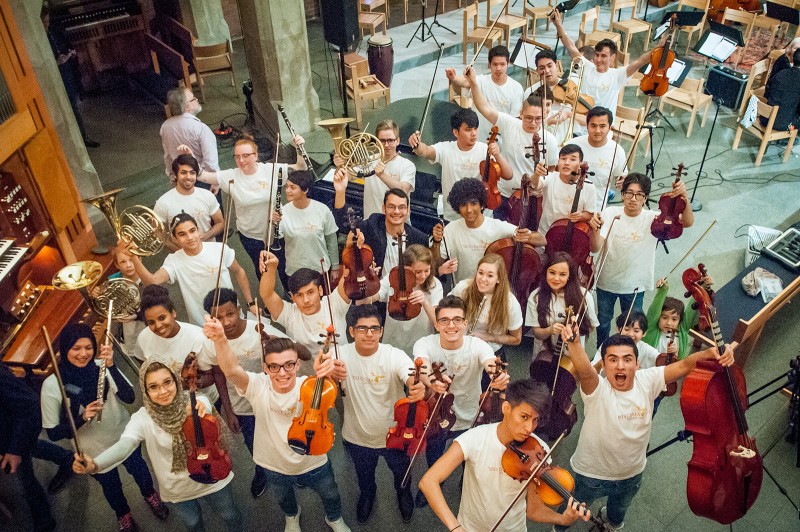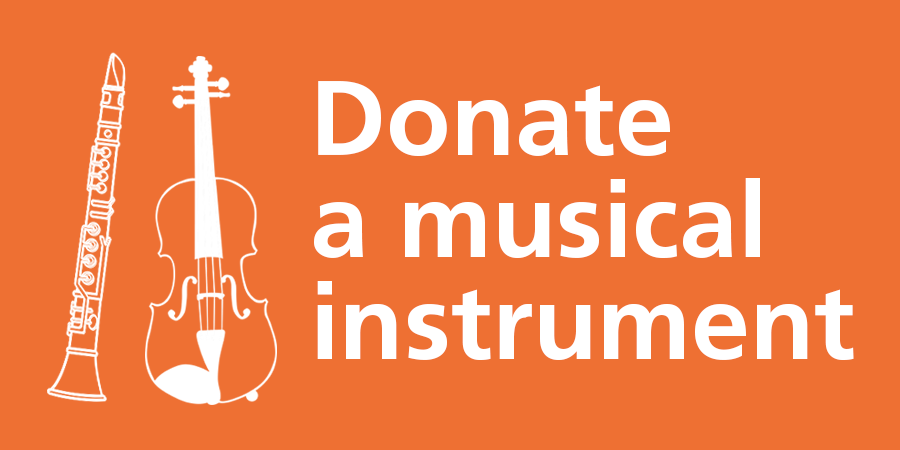The children in the classroom fled from Afghanistan, Syria, Iraq and Somalia. They know about war, about walking for days, weeks and months, hiding from border guards, travelling fifty to a boat or twenty to a car, and about concealing themselves under lorry platforms. Music, however, is something they know very little about.
They signed up for this after-school lesson in Angered, a suburb of Gothenburg, because other kids has been talking about the new orchestra. Venezuelan conductor Ron Davis Alvarez introduces himself and a handful of volunteer teachers. They give a short demonstration of each instrument and the students smile politely, maybe wondering if all of this is part of the Western culture that they are meant to assimilate into.
Then Ron says: ‘Maybe some of you will recognise this music’, and he plays Sultan Qalbam (The King Of My Heart), a song from Afghani composer Ahmad Zahir. The expression of the young refugees changes instantly. Smiles are huge, eyes are wide-open, heads nod, tears flow and some of them begin to sing. Ron has won them over.
‘If you want to play music, this is the deal’, he explains. ‘I have absolute faith that you can play an instrument. If you can also have absolute faith in yourself, then you are in.’ As we pack up, they huddle around a list to write in their names and join El Sistema Sweden’s Dream Orchestra. A tall boy with a massive afro comes up to Ron and makes him promise that next time they meet he will also play a piece from Somalia.
In the afternoon the orchestra is rehearsing in a church in Gothenburg. A 15 year old girl from Kabul shows up. She’d been nagging her cellist friend to bring her with him. Ron hands her a cello. I teach her how to hold the bow but most of what she learns today will come from her friend who sits next to her and tells her which strings to play and when.
‘At this stage, this is not about technique’, Ron tells me later. ‘This is about making them fall in love with music.’ And that is exactly what happens. The director of a children’s home where some of the refugees live has had to lock up their instruments every night at bedtime, because if not the kids won’t stop playing.
The next day the new girl shows up for rehearsal with another friend that also wants to join. A day later, she is playing in the orchestra’s first concert. Before the performance Ron tells the group: ‘I don’t want good. I want amazing. And amazing is not about not having mistakes. It is about feeling and passion.’ And feeling and passion are exactly what flow from the ensemble.
The repertoire is conceived to make the young players feel part of a global family. They play the hymn Now The Day Is Over, Beethoven’s Ode To Joy, the Afghan song that Ron performed at the school, an Inuit folk song, a merengue from Venezuela and a Swedish piece that celebrates friendship. Children from a local choir accompany them.
I talk to some of the refugees after the performance. I fight off the temptation to ask about their home countries and the journey to Sweden because I know it is a painful subject and they’ve already spent the last few days talking to a reporter from The New York Times who is writing a feature. I just ask them what this orchestra means to them and how they felt after their first performance.
Zara (17), a flute player from Iraq, admits she was terrified. ‘I only started a week ago, how am I going to play in a concert? This is a dream come true!’, she says. Now that she knows she was up to the challenge, she is confident that next time she won’t be as nervous.
Amir (17), a violinist from Afghanistan, says that at first he doubted that he could play an instrument: ‘It seemed so difficult. Now I love music and I love my new family.’
Mostafa (17), a cellist also from Afghanistan, says: ‘I only hope that one day I have a chance to help other people through music.’
Rey Trombetta
Comms and Project Manager
Sistema England






